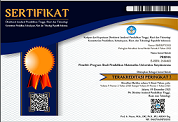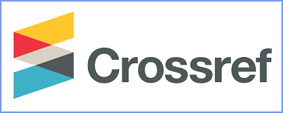THE COMPARISON BETWEEN THE USE OF NHT TYPE AND STAD TYPE OF COOPERATIVE MODEL IN CONTEXTUAL APPROACH SETTING ON JUNIOR HIGH SCHOOL STUDENTS' MATHEMATICAL UNDERSTANDING
Abstract
The low skill of students' mathematical understanding can affect the quality of students' learning which has an impact on the low achievement of students' in schools. One effort to improve the skill of understanding is by choosing and applying the model of learning that can enable students' eagerness to learn, namely cooperative learning model which can be used as an alternative learning model. Objectives to be gained in this study is to determine whether there is difference in the skill of mathematical understanding of junior high school students which use contextual approach setting cooperative learning model NHT type with STAD type on the subject of bangun ruang sisi datar. The method used in this research is subject experiments to students of SMP class VIII which is divided into two experimental groups, namely NHT type and STAD type. Teachers can develop cooperative learning model because it can improve students' learning outcomes. Teachers should experiment with learning methods more for the sake of the most appropriate and varied models selection.
Â
Key words: Mathematical understanding, Cooperative Learning, NHT, STAD
Full Text:
PDFReferences
Arikunto, Suharsimi (2006). Prosedur Penelitian. Jakarta: Rineka Cipta.
Arikunto, Suharsimi (2002). Dasar-dasar Evaluasi Pendidikan. Jakarta: Bumi Aksara.
Arikunto, Suharsimi (2009). Dasar-dasar Evaluasi Pendidikan. Jakarta: Bumi Aksara.
Alsailah, C.A. (2005). Contextual Teaching and Learning Menjadi Kegiatan Belajar Mengajar Mengasyikan dan Bermakna.Bandung: MMC
Gunawan, A. W. (2010). Genius Learning Strategy. Jakarta: PT Gramedia Pustaka Utama.
Ibrahim, R. dan Sudjana, N. (2003). Perencanaan Pengajaran. Jakarta: Rineka Cipta.
Johonson, Elanie B. (2010). Contextual Teaching & Learning, Terjemahan Alwasilah A. Chaedar. Cetakan ke 1. Bandung: Kaifa.
Lie, Anita (2002). Cooperative Learning. Mempraktikkan Cooperative Learning di Ruang-Ruang Kelas. Jakarta: Gramedia.
NCTM. (1989). Curuculum and Evaluation Standards for School Mathematics. Reston, VA: NCTM.
Ruseffendi, H.E.T. (2010). Dasar-dasar Penelitian Pendidikan dan Bidang non-Eksakta lainnya. Bandung: Tarsito.
Slavin, Robert, E. (1995). Cooperative Learning: Theory, Research and Practice. Scond Edition. Boston: Allyn and Bacon Publisher.
Slavin, Robert (2008). Cooperative Learning Teori, Riset dan Praktik. Bandung : Nusa Media
Surakhmad, W. (1994). Penghantar Penelitian Ilmiah. Bandung: Tarsito.
DOI: https://doi.org/10.35194/jp.v8i1.385
Refbacks
- There are currently no refbacks.
Copyright (c) 2019 PRISMA
Prisma Indexing :Â

PRISMA by UNIVERSITAS SURYAKANCANA is licensed under a This work is licensed under a Creative Commons Attribution-ShareAlike 4.0 International License.Based on a work at https://jurnal.unsur.ac.id/prisma.


1.jpg)








